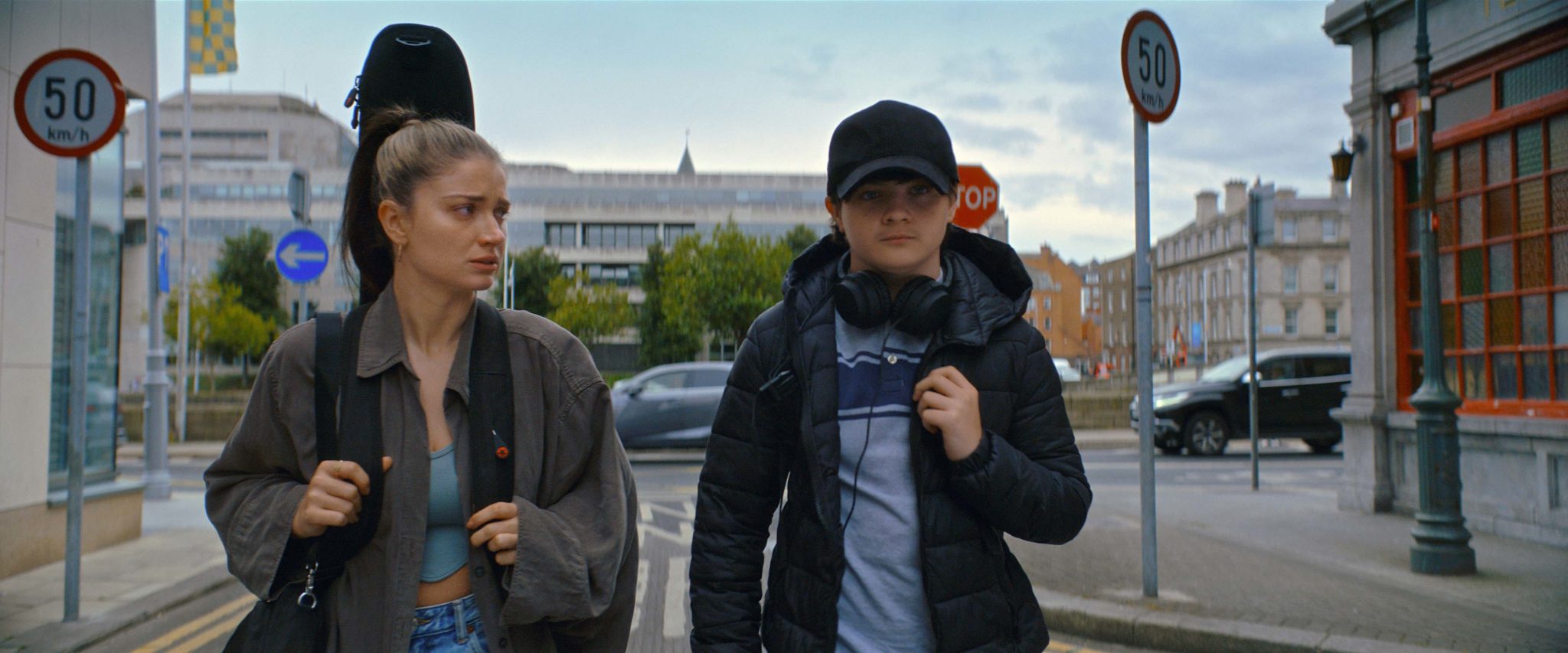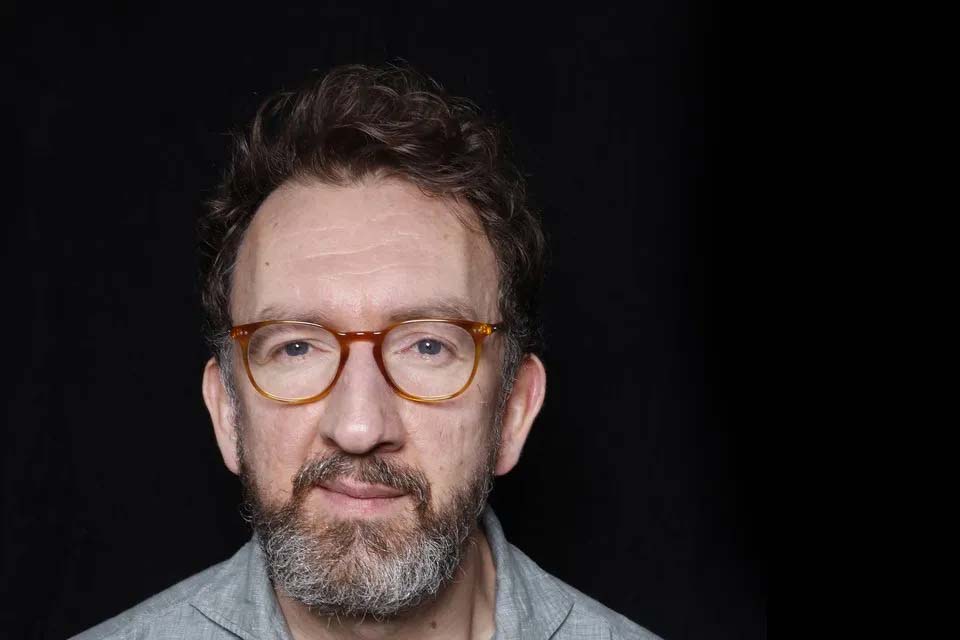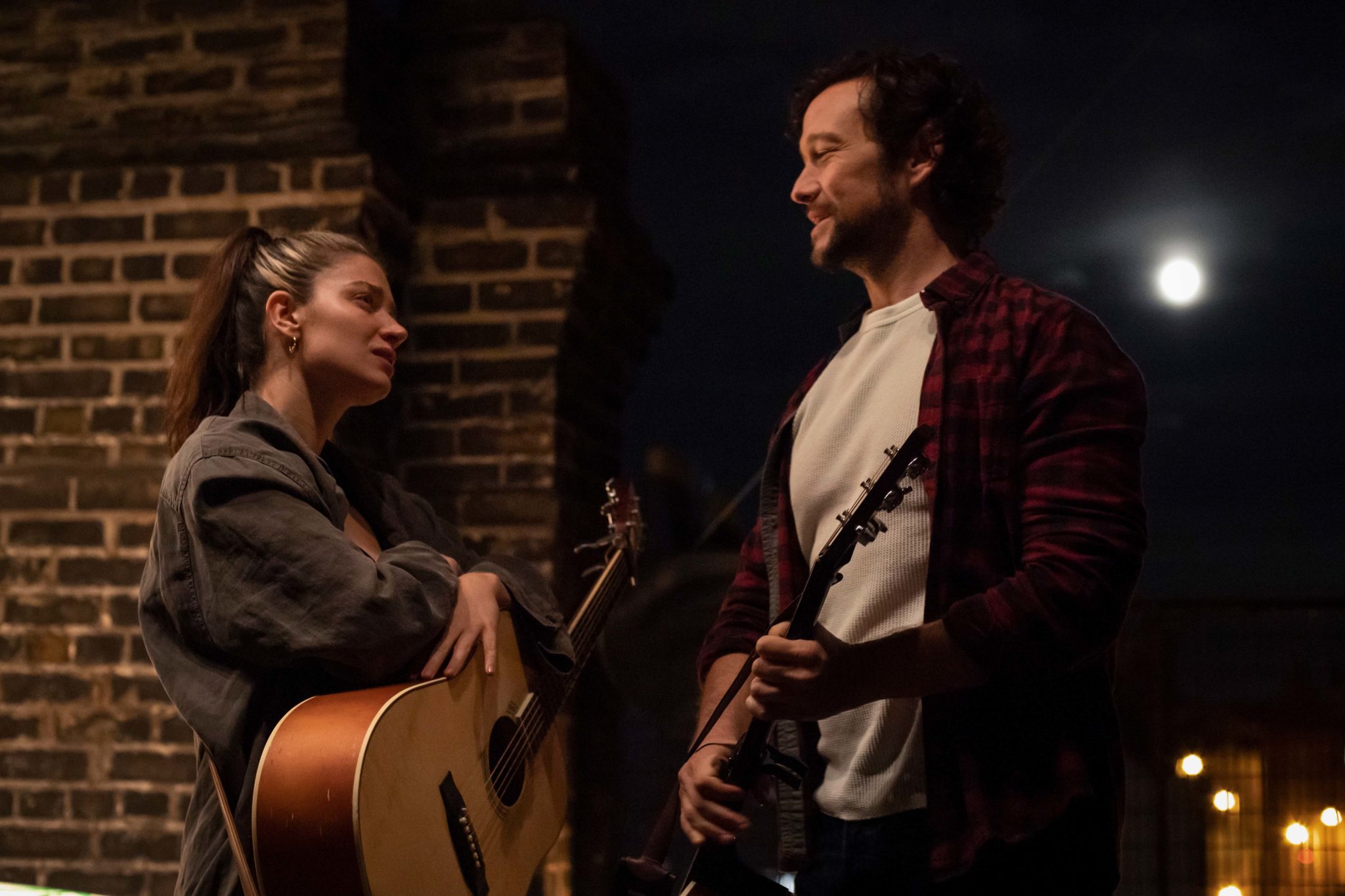- Film And TV
- 05 Oct 23
John Carney on Flora and Son: "Eve was clearly going to be a force to be reckoned with. She’s one to always try make something funnier or quirkier"

Acclaimed director John Carney on his compelling new movie, Flora And Son, which explores how music changes the lives of a single mother and her teen son.
When I meet John Carney in the Conrad Hotel in Dublin, the setting has sent him on a nostalgia trip, as when he was a teenager, he once filmed outside the then brand new hotel.
“It was really new and posh, he reflects, “and I needed a glass building for something I was making.”
A few decades later, the Conrad still feels posh – but Dublin feels different, as it often does for Carney, who has explored different versions of the city through his films Once, Sing Street and now Flora And Son. His new offering focuses on a single mother (Eve Hewson) living with her teenage son (Orén Kinlan) in a flat in inner city Dublin, and how music comes to change them both.

Eve Hewson and Orén Kinlan in Flora and Son
“I was just thinking as I was walking here that it does feel different,” says Carney of his home city. “You know, it’s not me just getting older. My theory is that Ireland didn’t really have the ’60s – not just in terms of culture, but architecturally. Some very wealthy or middle class people had a bit of a ‘60s, but most didn’t, so the ‘80s and ‘90s – which were the years I was coming up – felt more like the ‘50s. Not necessarily in a bad way – it was good and bad – but a lot of people haven’t grown up because they hadn’t been through the sexual revolution.
“So men had really fallen behind. But structurally and in terms of like, the pubs and the cafes, it still felt like you were walking around the Flann O’Brien era, which was lovely. You had the city that was connecting with the past.”
But in the ‘90s, the city was also connecting with its future, as the Irish Film Board was reconstituted in 1993, opening up new opportunities and supports for filmmakers – Carney included.
“The floodgates were opened for opportunities,” he recalls. “So many artists, actors, musicians, we all love to tell ourselves, ‘It was me.’ But it’s so many of us were at the well. That new identity that was beginning for Ireland, and Dublin and Galway, was brilliant and supportive of creative people.”
But Ireland can feel very different – indeed hostile – to young creatives now, who are being priced out of their cities, forced to live at home into their thirties, and watching as the cultural spaces are stripped away and replaced by hotels.
“You do need guardians of culture,” says Carney. “You need people to say, ‘Hang on a second. This is gone too far, we don’t need more hotels.’ It’s great to have all of that, because we have students coming in, and if all these tech companies want to spend their money here, great. But no-one’s going to stay if all they can do is go for a phoney fake pint for €10.”

John Carney
But Carney also believes it’s important to recognise what Ireland does right.
“Having travelled a lot with Flora and around Europe, Ireland is a pretty deadly place,” he enthuses. “It’s brilliant. Of course, there’s work to be done, tonnes of things to fix, tonnes of these conversations that we’re having, because where are the cultural hubs? Why are they closing? That’s true, but you don’t want the kneejerk reaction that you get of like, ‘Okay, let’s tear it all up now. And Sinn Fein will solve everything. They’ll get the homeless off the street.’ And this kneejerk reaction of, ‘Oh, Ireland is full.’”
I’m speaking with Carney the day after the aggressive far-right protest at Leinster House.
“That’s just such old hash,” he says. “Ireland is not remotely full, and Dublin is unbelievably multicultural, and anybody with their head screwed on is welcoming that change. Suddenly all these people really care for their own homeless as long as they’re Irish. Or ‘their’ women. You get these lads saying, ‘I’m scared for the women.’ Oh, yeah? Like, really, like I had a sister and girlfriends walking home in the ’80s and ’90s in Dublin. It was still ropey and dicey, were you protesting for them?
“This is basically a bunch of indoctrinated idiots, who I actually feel shouldn’t be getting a megaphone. I’m beginning to think we shouldn’t even report on them. You can hope that all that those people need is attention. They can’t get it, because they’re not normal people. And we really have to be careful that we don’t put them on the newspaper front pages, because they’re trained to get that traction. And I think the most frustrating thing for them is if you just smile and move on. That’s how we used to deal with nutters in the ’80s – you wouldn’t scream at them or push back. You’d kind of just go, ‘The poor thing.’”
Flora And Son does, in its own way, tackle questions of what it means to be a young man in Dublin, as Flora’s 14-year-old son, Max, is surrounded by peers who posture in designer gear, rapping about expensive cars, guns and women. These groups are obviously inspired by some acts on the Irish music scene. Carney wanted to explore the pressure on young men, but also the soullessness of some of the music they’re told to idolise.
“I was thinking about myself a lot as a 14-year-old,” he notes. “That’s who I identify with in this movie – I usually have a central male character where I think, ‘I’m a bit like that.’ So I was thinking about this kid and what I was listening to at that age. I was trying to modernise that authentically, to try and get inside what it’s like now for a 14-year-old who’s all over the internet?”
As Flora begins learning guitar, opening up a new aspect of herself and forging a connection with her online music teacher (Joseph Gordon Levitt), Max also starts finding himself through music, writing rap lyrics about his life and a girl he likes, and finding the joy in creating harmonies and melodies.

Eve Hewson and Joseph Gordon Levitt
“He’s an introverted kid, and I didn’t want him to be like an angry drill guy,” says Carney. “Because I just think that music is dead. I just don’t think there’s beauty in that music or love – and I think there’s beauty and love in punk and certainly hip-hop. You can be angry, but when there’s no love, it’s kind of dead music to me. There’s lots of it in Dublin now – very angry, male, bitter, bad rhymes and bling and all that. It’s very repetitive and the music’s hideous.
“So I was trying to figure out a way of making this Max character get the shit off his chest. He’s thinking about, like, ‘I want to impress the girl and you can ride my Mercedes’. But then when he sings to his mother about how he sees her now, I wanted to try and find beautiful melodies and harmonies that still felt plausible.”
Max isn’t the only relationship Eve Hewson’s Flora is navigating, as she has to deal with Max’s selfish father (Jack Reynor) and her encouraging, kind-hearted music teacher, who introduces her to the music of Joni Mitchell and Tom Waits. Over time, Flora’s brashness and stubbornness is combined with – never replaced by – tenderness and hope. Hewson is a delight, playing Flora as loud, crude, funny and resilient, and Carney loved how game the actress was for both the music and comedy.
“Eve was clearly going to be a force to be reckoned with,” he says. “She’s one to always try make something funnier or quirkier. She’s really not afraid of doing stuff and being an idiot if it’s going to get the character across, which is great fun.”
The film addresses the great aim of art and good songs, which is to leave you changed. Carney says that a few things have changed him recently, including the film Triangle Of Sadness and Mik Pyro’s new album. And while Sing Street changed many people, Carney insists he’s not mad about not receiving an a Best Song Oscar nom for ‘Drive It Like You Stole It’, even though many of his fans are.
“That’s hilarious,” he laughs. “I was very glad about the Golden Globe nomination. It’s really good fun to win awards – but you shouldn’t do it for awards. Don’t put it up there as the as the holy grail because it’ll change the work. The work will become cosy and safe, because it’ll be going for awards.”
He pauses and smiles.
“But yeah, the second I heard that Damien. Chazelle was making La La Land, I was like, ‘Yeah, I picked the ideal year to make an indie musical!’”
• Flora And Son is in cinemas and on Apple TV+ now.
RELATED

- Film And TV
- 10 Nov 23
Elon Musk biopic in the works at A24 with Darren Aronofsky set to direct
RELATED

- Film And TV
- 22 Sep 23
Irish film Flora and Son to Submit Original Song ‘High Life’ for Oscar Consideration

- Film And TV
- 14 Sep 23
New Trailer released for Martin Scorsese's Killers of the Flower Moon

- Film And TV
- 25 Aug 23
New trailer for Irish musical film Flora and Son released

- Film And TV
- 26 May 23
Colin Farrell campaigns for writers' fair pay at WGA strike in New York

- Film And TV
- 04 Oct 22
Will Smith film Emancipation to stream on Apple following slap controversy

- Film And TV
- 30 May 22



